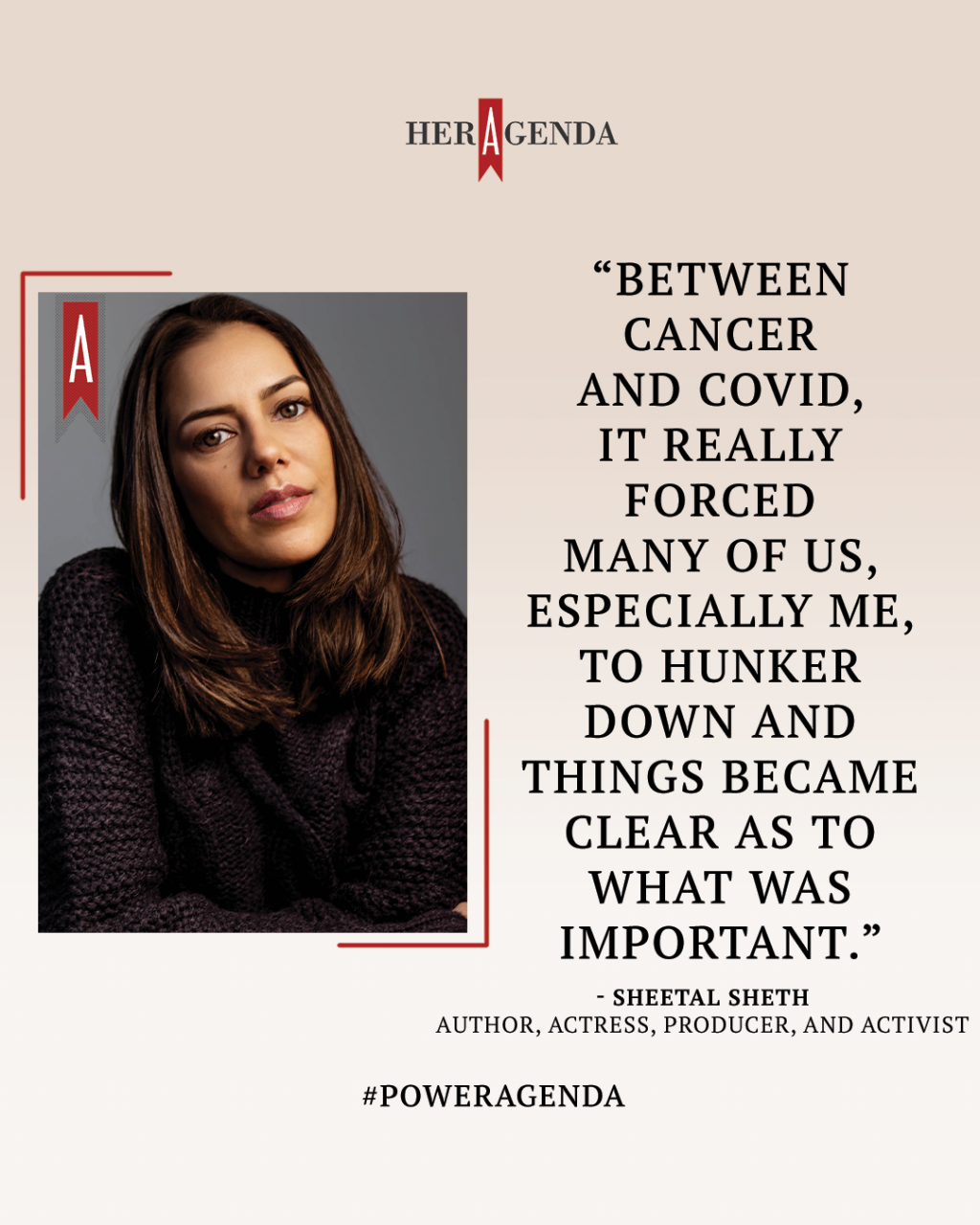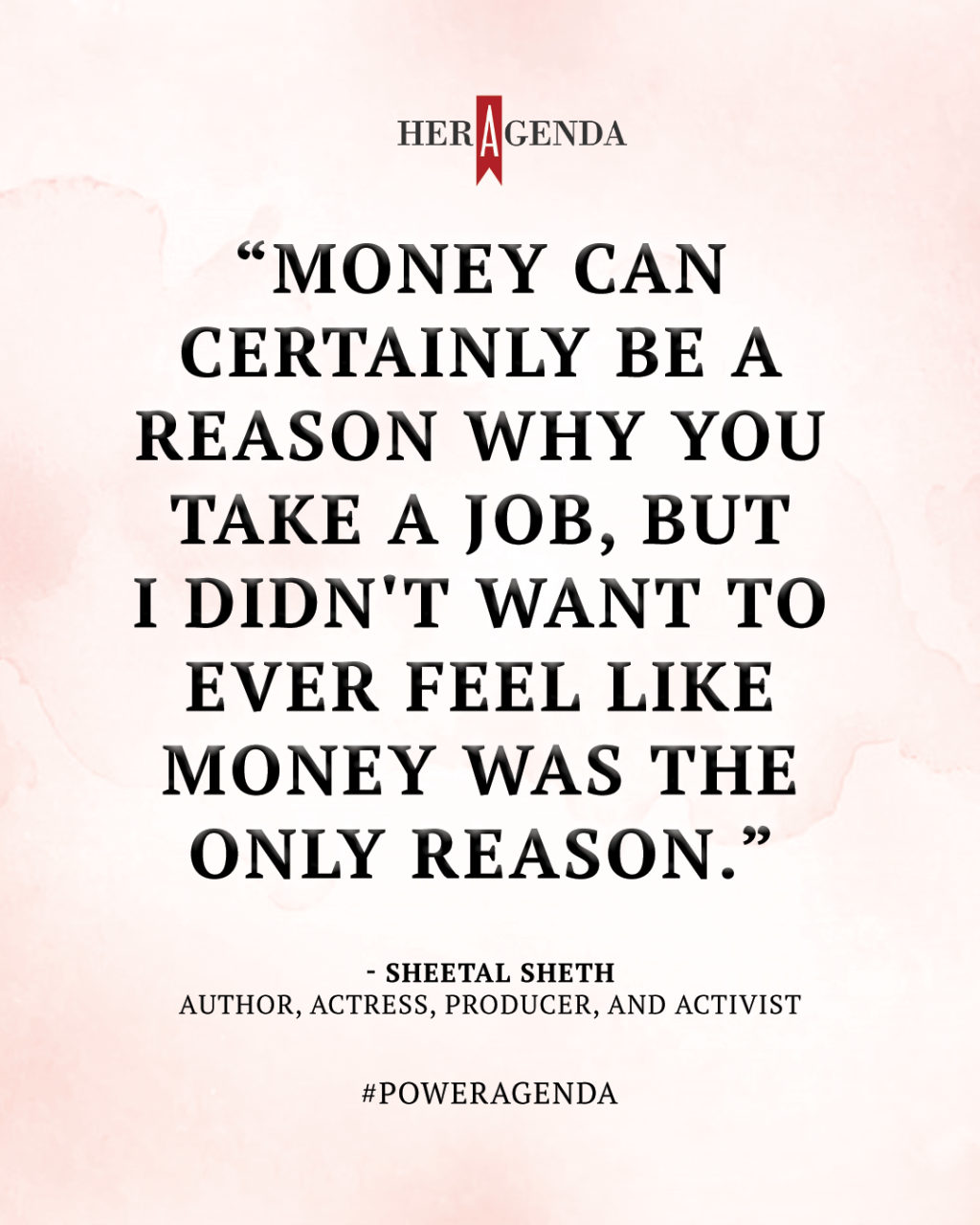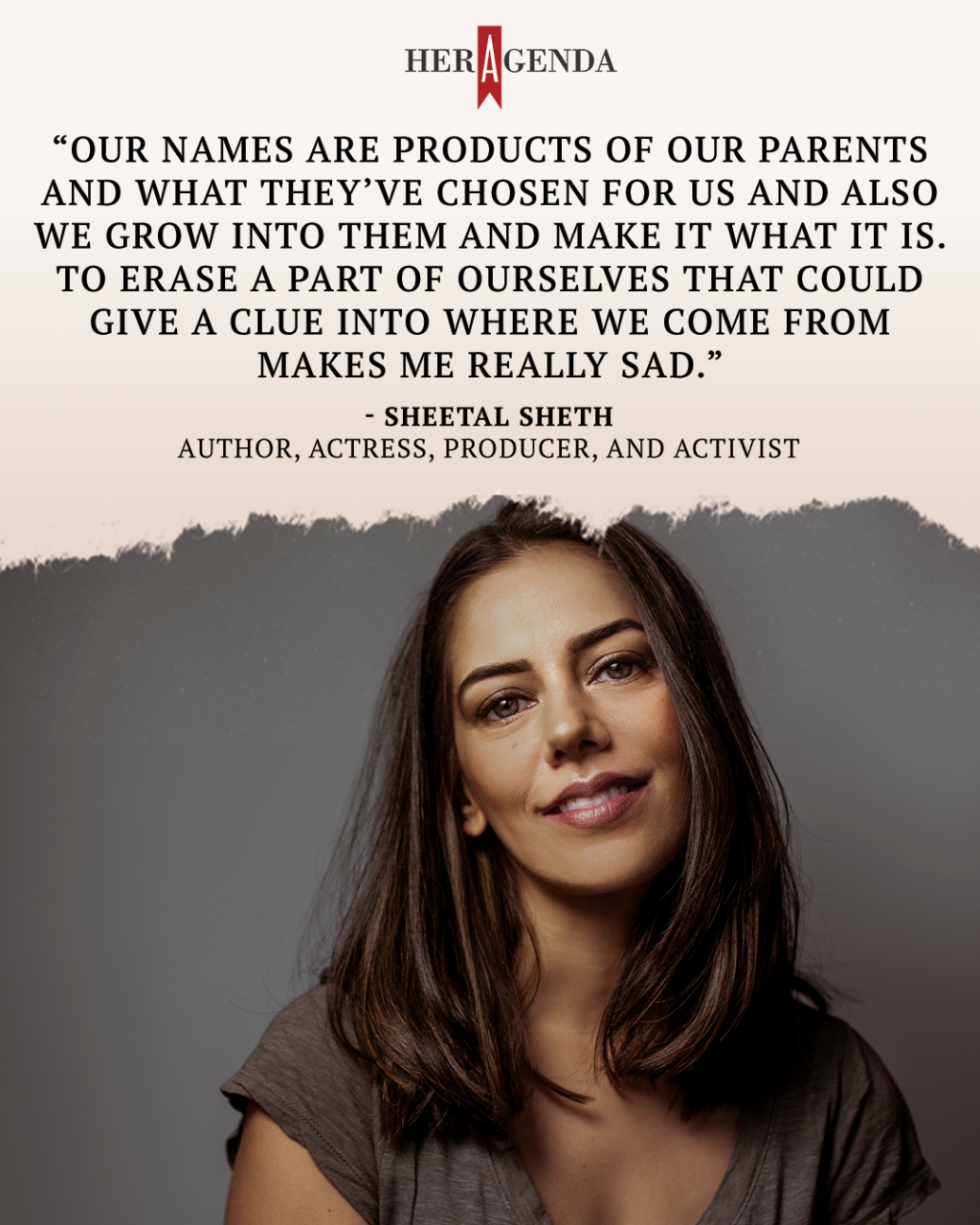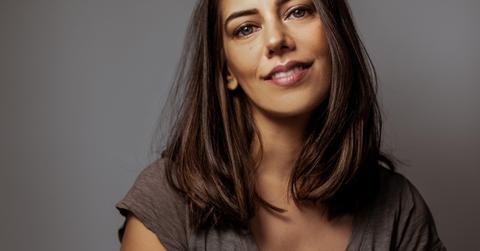Sheetal Sheth is a multi-hyphenated talent who is creating the world that she wished existed long ago.
As a first-generation Indian-American, Sheetal was raised in a small New Jersey city where she discovered her passion for acting in high school. After enrolling in and graduating from the Tisch School of the Arts at New York University, Sheetal was shocked by the minimal representation in the acting field. Yes, she succeeded as an actress by starring in films including Looking for Comedy in the Muslim World, ABCD and American Chai but her experiences as a South Asian actress left a tainted perspective on the industry. Once, she was even forewarned, “You are the number one choice for this part, but they are uncomfortable with someone of your name playing this part.” Knowing that these microaggressions still happen and affect children, Sheetal wanted a way to celebrate our differences as human beings.
On her mission to turn lemons into lemonade, Sheetal published her first children’s book, Always Anjali in May, 2018. With wide acclaim and positive reviews, it is set to be a series with the next installment, Bravo Anjali! to be published in Sept, 2021. Using her children’s upbringing as inspiration, Sheetal fictionally documents an American girl who overcomes challenges and is proud of her heritage. Her quest is for everyone, regardless of what makes them unique, to internalize their greatness.
Despite being the first Indian-American to appear in Maxim, Sheetal refuses to be known as merely an aesthetically pleasing commodity for audience consumption. Sheetal utilizes her platform as a proud activist within politics and has served in AmeriCorps (President Clinton’s National Service program), BBBS of LA, and is currently on the advisory board of Equality Now while serving as an ambassador for The Representation Project.
Her Agenda recently got the chance to catch up with Sheetal about her upcoming book, Bravo Anjali!, South Asian representation, and her road to breaking generational curses.
Her Agenda: During the past year and a half living under COVID restrictions, how have you been able to find “me” time and retain positive mental health time as a mother and wearing so many hats?
Sheetal Sheth: I’ve actually never been good at self-care and ‘me’ time. And, it took me getting cancer to really rethink the way I prioritize and what I do with my time. And, between cancer and COVID, it really forced many of us, especially me, to hunker down and things became clear as to what was important. I cut out a lot of things and people in my life that weren’t serving me in a certain way. And, I really did make self-care a priority since I am such a scheduler, I realized that I have to just schedule that in for myself.

Her Agenda: South Asian representation is minimal in storytelling and it’s so hard to be what you can’t see. Do you remember what caused you to believe that your existence was valid in the storytelling space?
Sheetal Sheth: I never had that. If there was representation, often people would point to any ethnicity, and I find that the conversations about inclusion and diversity stay very Black and white, literally and figuratively. There are so many of us that fall in-between, for instance perhaps a brown story about a South Asian kid. [Part of the reason why] I wrote these books is because I felt like I really wanted to see us doing normal things. When I was growing up stories were always centered around an extraordinary event like a holiday, religion, mythology-based, or arranged marriages. These are the common trends you see when it comes to South Asian narratives. But I wanted to show that we also play instruments, eat dinner with our family, have pets, and do the normal things that kids do. We want to see ourselves in that context otherwise we feel othered. The reason why I started writing this book series is because I did not see [authentic representation] growing up and even as a grown-up when I started having kids, the books that reflected the world for brown kids had a certain narrative that was either culturally insensitive or inaccurate.
!["The reason why I started writing this book series is because I did not see [authentic representation] growing up and even as a grown-up when I started having kids, the books that reflected the world for brown kids had a certain narrative that was either culturally insensitive or inaccurate." -Sheetal Sheth](https://media.heragenda.com/brand-img/286/0x0/wp-content/uploads/2021/08/POST-5-1-1024x1280.png)
Her Agenda: Your children’s series, Anjali, is the first picture book series that features a South Asian hero. And, The next edition in your book series, Bravo Anjali!, will be published on September 14, 2021. When you crafted the story and character, how did you curate it in a way that celebrated your heritage without adhering to the stereotypes through which the world views South Asian Culture?
Sheetal Sheth: I thought about it a lot and when I first started embarking on Anjali and the first book, she was really modeled after what I didn’t see in books. It was about presenting an American experience but with a very culturally rich background that was folded into her everyday life. We don’t need to make it performative or put her in bindis or sarees. Oftentimes when you see an Indian character on anything, they put them in ethnic garments or doing a Bollywood dance. So, Anjali’s story was very much the antithesis of that. I wanted her to be proud of who she was but she is an American kid. I thought to myself, ‘What does that look like as a second-generation American?’ The majority of stories are first-generation kids of immigrants and I wanted to move forward in that narrative because we’ve been here for a long time now. Let’s talk about the second or third generation, someone like my kids. Or someone like me who was born and raised here, very much the child of immigrants and tied to where she comes from, but all the kinds of things that I deal with trying to raise my kids now. That’s where Anjali is centered.
In addition, I also wanted to talk about things that I feel like people think kids don’t want to nor are ready to talk about. It’s impossible to not have them aware of what’s going on in the world and you need to make them a part of the conversation. I wanted to talk about real things but in an entertaining way. For example, the first book deals with identity, racism, and bullying in a way that is hopefully accessible, fun, and empowering.

Her Agenda: Other than being an author, you are also an actress. And, in a previous interview, you mentioned being up for a big role and getting turned down because producers wanted someone with a westernized name playing the part. And, your critically acclaimed book series revolves around the topic of identity. Was there a specific moment when you decided to turn lemons into lemonade with your story?
Sheetal Sheth: I guess it was when I started writing the book. I had so many things like that happen to me. When I started acting professionally, it was in the late ‘90s before social media and before we were having the conversations that we are having now. And, [it felt like] people could get away with whatever they wanted, things happened on a regular basis that I couldn’t even process or talk about them or I wouldn’t be able to get through the day. That’s how often it was happening. There’s only so much energy you can put into being outraged.
When I decided to write a book, I thought that I should just write from what I know, which is usually the best place to start. This idea of having to change a part of yourself to fit in, I feel is a very broad conversation with all of us, especially kids. For Anjali, it’s her name but for many kids, it could be other things as well. And, the whole point is to communicate that we don’t need to change any part of ourselves. But, I have many colleagues who have changed their names and it continues to happen. It makes me sad because I would never want to erase the name that was given to me. Our names are products of our parents and what they’ve chosen for us and also we grow into them and make it what it is. To erase a part of ourselves that could give a clue into where we come from makes me really sad, so I just wanted to have a way to talk about it with kids.

Her Agenda: Do you think writing this book contributed to your personal healing in some way?
Sheetal Sheth: I haven’t really thought about it in that way, but I think so. The first book has been so successful and I get messages daily from so many kids across the board of race, gender, ethnicity, and orientation. And clearly, it’s tapped into some things that people are feeling.
-I made a choice that I would bartend rather than do a job that I felt wasn’t moving the needle forward.
Her Agenda: Being a first-generation Indian-American, how have you maintained strength and inner voice on the road to breaking generational curses?
Sheetal Sheth: It’s so nice that you say that because I don’t feel it often. I think we are all fighting our own battles every day, sometimes small sometimes big. But, it’s always been about being honest and truly, truly authentic. When I was first started out as an actress, I bartended for a lot longer than I could have. I was getting work but there was a lot of work that I didn’t want to be a part of. I made a choice that I would bartend rather than do a job that I felt wasn’t moving the needle forward. To the point where I was in movies coming out in theaters and I’d have a premiere one night and then people who had seen would say, ‘Aren’t you in this movie?’ and I’d be slinging them drinks. I did it for over 10 years and people would be like, “I can’t even believe that you are still here!’ And I would say, ‘I am because this is the way I can give myself a choice and not have to take the jobs that I don’t want to take.’ It’s not for everybody but for me, that felt better. It’s just about being authentic and creating a space where you can. Money can certainly be a reason why you take a job, but I didn’t want to ever feel like money was the only reason.
[Editor’s note: This interview has been edited for length and clarity.]







